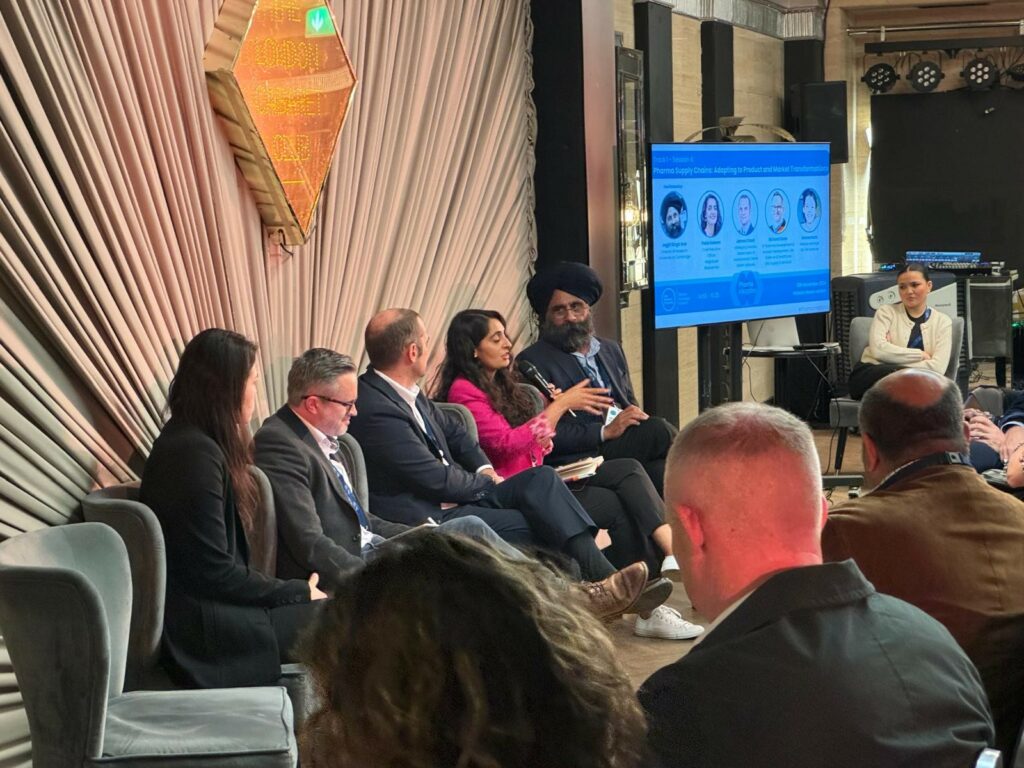
We’ve just got back from Pharma Integrates 2024, and can’t help but reflect back on what was a fantastic day of discussion and networking, full of optimism for the future of UK life science, healthcare and innovation.
This year’s Pharma Integrates brought together global leaders and stakeholders across the pharmaceutical, life sciences, and biotech industries. Through thought-provoking discussion, the diverse array of speakers and panellists voiced industry goals and needs, exchanged insights and delved into the critical issues shaping the future of patient care.
The event’s overarching themes, “Big Health Issues and Enablers” and “Technology” highlighted major industry trends and underscored the potential of the UK to become a life sciences superpower. The optimism around the UK’s role in global healthcare innovation was palpable, with discussions focused on creating impactful solutions for patients, improving data infrastructure and fostering public-private partnerships. See agenda page here.
This year’s venue, the iconic Victoria House in Bloomsbury, London, was kindly provided by Pioneer Group. Recently transformed by Pioneer Group and Oxford Properties into a state-of-the art hub for life-science innovation and collaboration, the stunning Grade II listed building set the stage for a deeply insightful and enjoyable day.
Miranda Knaggs, Corporate Development Director at Pioneer Group kicked off the event with a welcome address, outlining the development and vision for Victoria House. This wonderful asset will feature 300,000 sq. ft. of office and lab space, including rentable lab suites, a 24,000 sq. ft. incubator, heritage meeting rooms and communal spaces to foster collaboration.
It was a privilege to hold Pharma Integrates 2024 in such a beautiful venue. Dubbed “Life Science House” by George Freeman MP on the day, it will be a new beacon for UK life sciences. With the first laboratory tenants moving into the building in January 2025, we’re excited to see how the new centre will support innovation and discovery to improve patient lives.
In his keynote address, Russell Abberley, General Manager at Amgen UK and Ireland, and Acting President of the ABPI, discussed the attendees’ united commitment to innovation in healthcare. He highlighted the new incumbent UK Government’s recognition of the Life Sciences sector’s role in their economic growth plan, citing the Life Sciences Innovation Manufacturing Fund and increased NIHR funding.
Russell also emphasised the importance of shifting care from hospitals to communities, improving data infrastructure for better patient care, and promoting prevention through vaccines and diagnostics. He called for active participation in government consultations to shape future strategies like the NHS 10-Year Plan, urging attendees to contribute to creating a healthier, more innovative UK healthcare system.

“If we invest in medicines and vaccines and accelerate their adoption, we could see a 20% reduction in the incidence of the six most major health conditions, and in turn, could raise GDP by in excess of 26 billion annually within 10 years.”
The rousing keynote address flowed seamlessly into the first of two “fireside chats”, which would feature politicians, pharma leaders, and academics cover the big issues facing UK Pharma and life sciences.
The inimitable George Freeman MP led the first discussion, “The UK as a Life Sciences superpower” – a thought-provoking session that focused on the prospects of UK Life Sciences in the context of the current political and healthcare landscape. Discussions revolved around engaging the NHS, improving data integration and addressing the regulatory and accessibility gaps that hinder the uptake of innovations.
Panellists emphasised the UK’s lag in making new therapies and innovations available to patients, and also stressed the need to rebuild the UK’s clinical trial ecosystem to maintain global competitiveness. Baroness Nicola Blackwood, Chair of Genomics England, underscored the need for integrated health data and better tracking of health benefits to justify increased investment. The panel agreed on the necessity of a connected, digital, and preventative health innovation ecosystem.

“A healthy economy is driven by a healthy population. If we collaborate across government, industry, and academia, we can lead the world in innovation.”
The second fireside chat for Pharma Integrates 2024, “Unlocking precision medicine”, explored how precision medicine could revolutionise healthcare by improving accuracy and reducing treatment errors. Panellists, led by Indra Joshi, Wellbeing of Women, discussed the major opportunities and facilitators that could unlock the full potential of precision medicine.
Mike Trenell, DAISER, underlined the importance of data-driven care and the need for a new regulatory landscape to realise industry goals. Meanwhile, Paul Franks, Lund University, highlighted the necessity of decision support systems and the potential for precision medicine to either improve health equity or widen disparities. The panel agreed on the importance of collaboration and data sharing between academia, industry and healthcare sectors to achieve precision medicine’s goals.

“We are on the cusp of an exciting evolution in healthcare, where technology and data will drive more efficiency and advocacy in our healthcare system.”
Following the morning’s sessions, the day’s discussions split into two tracks, bringing leading voices together to debate more focused issues. Track 1, “Big health issues and enablers” started off with “Patients are a virtue”, which proved to be an insightful examination of patient-centric therapeutic development.
The session focused on integrating patient expertise as a cornerstone of drug development. Panellists discussed the transformative potential of involving patients as active partners across all stages of research—from trial design to regulatory dialogue. They explored challenges such as regulatory barriers, the need for better data sharing and the importance of fostering trust and collaboration between patients, researchers, and industry stakeholders.

“Patients are not just participants; they are experts in their own right. Their experiences, values and insights should guide decision-making at every stage of research and development.”
– Natasha Ratcliffe, LifeArc
The next session, “The rapid adoption of GLP-1’s” explored the transformative potential of blockbuster GLP-1 drugs in managing obesity and related chronic conditions. Panellists highlighted the drugs’ great potential, including significant reductions in cardiovascular events, but highlighted challenges such as patient adherence, cost, and the healthcare system’s ability to support widespread adoption.
Central to the discussion were the urgent need for data sharing, the value of wraparound care, including mental health support, and the potential for value-based pricing models. The panel also noted the growing role of digital technology in enhancing patient experience and improving outcomes.

“If we want GLP-1 therapies to deliver their full potential, we need to address the barriers of affordability, accessibility, and tolerability, while ensuring patients receive the wraparound support essential for long-term success.”
Session 3, “We’ve got the green light, are we ready to go?” examined the pharmaceutical industry’s progress toward ambitious CO2 reduction targets, including GSK’s goal to achieve 80% reduction by 2030, and the global effort to achieve net zero by 2050.
The panel explored challenges and opportunities across the supply chain, product life cycles, and eco-design innovations. A strong emphasis was placed on the necessity of collaboration, circular economy principles, and leveraging digital and process optimisation to reduce emissions. The importance of balancing sustainability with regulatory constraints and the cost-benefit implications of eco-conscious decisions was highlighted as central to achieving our industry’s decarbonisation goals.

“Sustainability is not just a cost; it’s an investment in the future. By embedding eco-design principles and leveraging innovative partnerships, the pharmaceutical industry can meet ambitious targets while delivering long-term value.”
The final session from Track 1, “Pharma supply chains: adapting to product and market transformations” examined the landscape and future prospects of pharmaceutical supply chains, highlighting the need for agility, resilience and collaboration.
Panellists discussed the critical balance between efficiency and resilience, the challenges posed by globalised supply chains, and the increasing importance of sustainability in supply chain design. A number of supply chain solutions were posited, included the integration of digital tools, decentralisation and cross-functional collaboration to mitigate risks and adapt to disruptions. The panel stressed the value of learning from other sectors, particularly automotive and consumer goods, where innovation is more readily adopted in supply chain strategies.

“Pharma supply chains are out of control, with critical points of failure often hidden deep in the supply chain. Understanding these risks and building collaboration across functions and sectors is essential to creating resilient, sustainable systems.”
The day’s second track, “Technology” set out to explore the role of digital technology, particularly rapidly-developing AI technology, in the future of healthcare and life science innovation, and how our industry can leverage digital tools to better meet patient needs.
“Let’s get digital” explored the transformative role of digital technologies in the life sciences and healthcare sectors. The panel highlighted advancements in data integration, digital biomarkers and AI applications in drug development and patient care. The panel voiced challenges such as data silos, regulatory compliance (e.g., the EU AI Act), and trust in digital solutions.
The session highlighted the potential of technologies like digital twins, predictive modelling, and personalised medicine strategies to revolutionise healthcare, while stressing the importance of ethical considerations and avoiding “automation bias.” It was noted that collaboration and learning from other industries were critical to accelerating technology adoption in healthcare.

“The pharmaceutical industry risks its own ‘Blockbuster Video’ moment if we fail to adopt and integrate digital technologies at scale. Agility and convergence of digital tools across research, manufacturing and commercialisation will define our future.”
The next session, “The 3 C’s: CDMO, CRO, and Change” delved into the evolving roles of CDMOs and CROs in nurturing strategic alliances with biotech and pharmaceutical companies. The discussion highlighted the value of shifting from transactional relationships to equal partnerships, emphasising collaborative risk-sharing, innovation and patient-focused outcomes.
Panellists explored the benefits of “one-stop-shop” models, the importance of regulatory compliance, and the challenges of managing intellectual property and data integration across partnerships.

“The era of transactional relationships is over. Equal partnerships, built on transparency and shared goals, are the only way to drive innovation and accelerate patient access to life-changing therapies.”
Session 3, “Next generation digital technology for pharma R&D and manufacturing” explored the next generation of digital technology in the lab, emphasising the shift from systems that purely capture data, to those offering higher-level insights and better patient outcomes. Panellists highlighted the potential of AI, digital twins and co-pilot technologies to enhance efficiency, quality by design, and patient-centric innovations.
The engaging discussion also explored strategies to break down data silos through interoperable systems, leveraging FAIR data standards and the exciting prospect of real-time collaboration. The conversation underlined the importance of ethical, responsible AI use and the delicate balance between patient safety and regulatory compliance with embracing automation and innovation.

“The era of AI and co-pilot systems is transforming the user experience by enabling real-time, seamless assistance—whether through voice, gesture, or chat—bridging the gap between complex data and actionable insights for scientists.”
A lively discussion finished the day for Pharma Integrates 2024, with “AI beyond drug discovery” examining the wider impact of AI on our industry, focusing on areas like early diagnosis, manufacturing, and patient engagement. Panellists discussed success stories in leveraging AI for chronic disease insights, pre-disease detection and immersive medical training highlighted its potential to transform healthcare.
Challenges such as data silos, regulatory hurdles, and bias in AI systems were once again highlighted. The conversation touched on the importance of training AI using diverse datasets to create equitable AI models. The panel also voiced the importance of balancing innovation with ethical considerations when creating patient-centric solutions.

“The ability of AI to detect patterns and insights that humans cannot offers unprecedented opportunities to improve early diagnosis and precision care.”
As the sun set on Pharma Integrates 2024, it was clear this wasn’t just a day of discussion – it was a call to arms for innovation, collaboration and progress. Each insightful session sparked inspiration and highlighted the collective responsibility of the life sciences sector to shape a healthier, more sustainable future.
Outside of the scheduled discussion, networking sessions buzzed with energy as attendees forged meaningful connections, exchanged ideas and explored opportunities for collaboration. These moments of connection highlighted the core mission of Pharma Integrates: fostering a united community committed to driving positive change.
Recurring themes echoed throughout the day: data integration, sustainability, patient-centric innovation, and ethical adoption of digital technologies. Together, they painted an optimistic picture of the UK as a global leader in healthcare and life sciences. The message was clear: by working together across industries, academia and government, we can overcome today’s challenges and unlock tomorrow’s possibilities.
